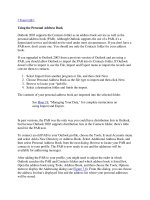The personal MBA josh kaufman
Bạn đang xem bản rút gọn của tài liệu. Xem và tải ngay bản đầy đủ của tài liệu tại đây (1.83 MB, 364 trang )
Praise for The Personal MBA
“Fundamentals are fundamentals. Whether you’re an entrepreneur or an executive at a Fortune 500
company, this book will help you succeed.”
—John Mang, Vice President of Japan Fabric & Home Care, Procter & Gamble
“This book goes far beyond business: I used the marketing, sales, and communication principles in
this book to complete my PhD and land a highly competitive postdoc and professorship at a worldclass research university. Whatever you do for a living, this book will help you do it even better.”
—Dr. Zachary Gagnon, Assistant Professor of Chemical Engineering, Johns
Hopkins University
“If you’re thinking of starting a business, this book will radically increase your confidence. If you’re
already running a business, this book will help you identify weaknesses in your systems to get better
results. If you’re thinking about plunging yourself into debt to get an MBA, this book will challenge
you to your core. Are you more interested in becoming a better businessperson, or having a document
to hang on your wall to impress people?”
—Daniel Joshua Rubin, Playwright and Portrait Artist
“I graduated with an MBA in 2005 before I encountered The Personal MBA, but I still felt like I
didn’t know anything about business. In retrospect, I wish I had read this book before enrolling in an
MBA program—it would’ve helped me be more mindful while completing my degree. Who knows…
I might have skipped the MBA completely. This is easily the best foundational business book
available.”
—Roger Hui, Technical Account Manager, RedHat, Inc.
“I used the mental models in this book to create a profitable business in less than four weeks. Josh
quickly dispels many mistaken beliefs about entrepreneurship, and his guidance has made me vastly
more productive and successful, and my life more fulfilling.”
—Evan Deaubl, President and CEO, Tic Tac Code, LLC
“These concepts really work: I’m booked solid with clients, making eight times more money, feeling
far less overwhelmed, and having a lot more fun. If you want to live up to your potential, you can’t
afford to miss this book.”
—Tim Grahl, Founder and CEO, Out:think Group
“After one hour with Josh, I immediately used his advice to bring in an extra $120,000 this year.
These simple principles are astoundingly effective.”
—Dan Portnoy, Founder and CEO, Portnoy Media Group
ABOUT THE AUTHOR
Josh Kaufman is an independent business advisor who helps people make more money, get more
done, and have more fun running their business. Before creating PersonalMBA.com, he worked for
Procter & Gamble, where he launched major new products and developed P&G’s global online
marketing measurement strategy. He lives in Colorado.
THE PERSONAL
MBA
Master the Art of Business
JOSH KAUFMAN
PORTFOLI/OPENGUIN
PORTFOLIO / PENGUIN
Published by the Penguin Group
Penguin Group (USA) Inc., 375 Hudson Street,
New York, New York 10014, U.S.A.
Penguin Group (Canada), 90 Eglinton Avenue East, Suite 700,
Toronto, Ontario, Canada M4P 2Y3 (a division of Pearson Penguin Canada Inc.)
Penguin Books Ltd, 80 Strand, London WC2R 0RL, England
Penguin Ireland, 25 St. Stephen’s Green, Dublin 2, Ireland
(a division of Penguin Books Ltd)
Penguin Books Australia Ltd, 250 Camberwell Road, Camberwell,
Victoria 3124, Australia (a division of Pearson Australia Group Pty Ltd)
Penguin Books India Pvt Ltd, 11 Community Centre, Panchsheel Park,
New Delhi—110 017, India
Penguin Group (NZ), 67 Apollo Drive, Rosedale, Auckland 0632,
New Zealand (a division of Pearson New Zealand Ltd)
Penguin Books (South Africa) (Pty) Ltd, 24 Sturdee Avenue,
Rosebank, Johannesburg 2196, South Africa
Penguin Books Ltd, Registered Offices:
80 Strand, London WC2R 0RL, England
First published in the United States of America by Portfolio / Penguin, a member of Penguin Group (USA) Inc. 2010
This paperback edition with new material published 2012
10 9 8 7 6 5 4 3 2 1
Copyright © Worldly Wisdom Ventures LLC, 2010, 2012
All rights reserved
THE LIBRARY OF CONGRESS HAS CATALOGED THE HARDCOVER EDITION AS FOLLOWS:
Kaufman, Josh.
The personal MBA : master the art of business / Josh Kaufman.
p. cm.
Includes index.
ISBN: 978-1-101-44608-9
1. Management. 2. Management—Study and teaching. 3. Business.
4. Commerce. I. Title.
HD31.K343 2010
650—dc22
2010027919
Printed in the United States of America
Set in Adobe Caslon Pro
Designed by Jaime Putorti
Without limiting the rights under copyright reserved above, no part of this publication may be reproduced, stored in or introduced into a
retrieval system, or transmitted, in any form or by any means (electronic, mechanical, photocopying, recording or otherwise), without the
prior written permission of both the copyright owner and the above publisher of this book.
The scanning, uploading, and distribution of this book via the Internet or via any other means without the permission of the publisher is
illegal and punishable by law. Please purchase only authorized electronic editions and do not participate in or encourage electronic piracy
of copyrightable materials. Your support of the author’s rights is appreciated.
ALWAYS LEARNING
PEARSON
To the millions of business professionals worldwide who work to make people’s lives
better, in ways large and small.
CONTENTS
Key Terms
A Note to the Reader
Introduction: Why Read This Book?
You Don’t Need to Know It All
No Experience Necessary
Questions, Not Answers
Mental Models, Not Methods
My “Personal” MBA
A Self-Directed Crash Course in Business
The Wheat and the Chaff
The Personal MBA Goes Global
Munger’s Mental Models
Connecting the Dots
For the Skeptics
Should You Go to Business School?
Three Big Problems with Business Schools
Delusions of Grandeur
Your Money AND Your Life
Breaking Out the Benjamins
What an MBA Will Actually Get You
Where Business Schools Came From
In Search of Distribution
Playing with Fire
No Reason to Change
The Single Benefit of Business Schools
I Owe, I Owe—It’s Off to Work I Go
A Better Way
What You’ll Learn in This Book
How to Use This Book
1 Value Creation
The Five Parts of Every Business
Economically Valuable Skills
The Iron Law of the Market
Core Human Drives
Status Seeking
Ten Ways to Evaluate a Market
The Hidden Benefits of Competition
The Mercenary Rule
The Crusader Rule
Twelve Standard Forms of Value
Form of Value #1: Product
Form of Value #2: Service
Form of Value #3: Shared Resource
Form of Value #4: Subscription
Form of Value #5: Resale
Form of Value #6: Lease
Form of Value #7: Agency
Form of Value #8: Audience Aggregation
Form of Value #9: Loan
Form of Value #10: Option
Form of Value #11: Insurance
Form of Value #12: Capital
Hassle Premium
Perceived Value
Modularity
Bundling and Unbundling
Prototype
The Iteration Cycle
Iteration Velocity
Feedback
Alternatives
Trade-offs
Economic Values
Relative Importance Testing
Critical Assumptions
Shadow Testing
Minimum Viable Offer
Incremental Augmentation
Field Testing
2 Marketing
Attention
Receptivity
Remarkability
Probable Purchaser
Preoccupation
End Result
Qualification
Point of Market Entry
Addressability
Desire
Visualization
Framing
Free
Permission
Hook
Call-To-Action (CTA)
Narrative
Controversy
Reputation
3 Sales
Transaction
Trust
Common Ground
Pricing Uncertainty Principle
Four Pricing Methods
Price Transition Shock
Value-Based Selling
Education-Based Selling
Next Best Alternative
Exclusivity
Three Universal Currencies
Three Dimensions of Negotiation
Buffer
Persuasion Resistance
Reciprocation
Damaging Admission
Barriers to Purchase
Risk Reversal
Reactivation
4 Value Delivery
Value Stream
Distribution Channel
The Expectation Effect
Predictability
Throughput
Duplication
Multiplication
Scale
Accumulation
Amplification
Barrier to Competition
Force Multiplier
Systemization
5 Finance
Profit
Profit Margin
Value Capture
Sufficiency
Valuation
Cash Flow Statement
Income Statement
Balance Sheet
Financial Ratios
Cost-Benefit Analysis
Four Methods to Increase Revenue
Pricing Power
Lifetime Value
Allowable Acquisition Cost (AAC)
Overhead
Costs: Fixed and Variable
Incremental Degradation
Breakeven
Amortization
Purchasing Power
Cash Flow Cycle
Opportunity Cost
Time Value of Money
Compounding
Leverage
Hierarchy of Funding
Bootstrapping
Return on Investment (ROI)
Sunk Cost
Internal Controls
6 The Human Mind
Caveman Syndrome
Performance Requirements
The Onion Brain
Perceptual Control
Reference Level
Conservation of Energy
Guiding Structure
Reorganization
Conflict
Pattern Matching
Mental Simulation
Interpretation and Reinterpretation
Motivation
Inhibition
Willpower Depletion
Loss Aversion
Threat Lockdown
Cognitive Scope Limitation
Association
Absence Blindness
Contrast
Scarcity
Novelty
7 Working with Yourself
Akrasia
Monoidealism
Cognitive Switching Penalty
Four Methods of Completion
Most Important Tasks
Goals
States of Being
Habits
Priming
Decision
Five-Fold Why
Five-Fold How
Next Action
Externalization
Self-Elicitation
Counterfactual Simulation
Parkinson’s Law
Doomsday Scenario
Excessive Self-Regard Tendency
Confirmation Bias
Hindsight Bias
Performance Load
Energy Cycles
Stress and Recovery
Testing
Mystique
Hedonic Treadmill
Comparison Fallacy
Locus of Control
Attachment
Personal Research and Development (R&D)
Limiting Belief
8 Working with Others
Power
Comparative Advantage
Communication Overhead
Importance
Safety
Golden Trifecta
Reason Why
Commander’s Intent
Bystander Apathy
Planning Fallacy
Referrals
Clanning
Convergence and Divergence
Social Signals
Social Proof
Authority
Commitment and Consistency
Incentive-Caused Bias
Modal Bias
Pygmalion Effect
Attribution Error
Option Orientation
Management
Performance-Based Hiring
9 Understanding Systems
Gall’s Law
Flow
Stock
Slack
Constraint
Feedback Loop
Autocatalysis
Environment
Selection Test
Uncertainty
Change
Interdependence
Counterparty Risk
Second-Order Effects
Normal Accidents
10 Analyzing Systems
Deconstruction
Measurement
Key Performance Indicator
Garbage In, Garbage Out
Tolerance
Analytical Honesty
Context
Sampling
Margin of Error
Ratio
Typicality
Correlation and Causation
Norms
Proxy
Segmentation
Humanization
11 Improving Systems
Intervention Bias
Optimization
Refactoring
The Critical Few
Diminishing Returns
Friction
Automation
The Paradox of Automation
The Irony of Automation
Standard Operating Procedure
Checklist
Cessation
Resilience
Fail-safe
Stress Testing
Scenario Planning
Sustainable Growth Cycle
The Middle Path
The Experimental Mind-set
Not “The End”
Acknowledgments
Appendix A: How to Continue Your Business Studies
Appendix B: Forty-nine Questions to Improve Your Results
Notes
Index
KEY TERMS
Absence Blindness
Accumulation
Addressability
Agency
Akrasia
Allowable Acquisition Cost
Alternatives
Amortization
Amplification
Analytical Honesty
Association
Attachment
Attention
Attribution Error
Audience Aggregation
Authority
Autocatalysis
Automation
Balance Sheet
Barrier to Competition
Barriers to Purchase
Bootstrapping
Breakeven
Buffer
Bundling and Unbundling
Bystander Apathy
Call-To-Action
Capital
Cash Flow Cycle
Cash Flow Statement
Caveman Syndrome
Cessation
Change
244
155
96
56
252
141
72
188
156
374
242
302
87
337
57
329
353
397
174
157
137
202
187
130
66
319
106
62
191
170
208
403
358
Checklist
Clanning
Cognitive Scope Limitation
Cognitive Switching Penalty
Commander’s Intent
Commitment and Consistency
Common Ground
Communication Overhead
Comparative Advantage
Comparison Fallacy
Compounding
Confirmation Bias
Conflict
Conservation of Energy
Constraint
Context
Contrast
Controversy
Convergence and Divergence
Core Human Drives
Correlation and Causation
Cost-Benefit Analysis
Costs: Fixed and Variable
Counterfactual Simulation
Counterparty Risk
Critical Assumptions
Critical Few
Crusader Rule
Damaging Admission
Decision
Deconstruction
Desire
Diminishing Returns
Distribution Channel
Doomsday Scenario
Duplication
Economic Values
Economically Valuable Skills
401
323
240
257
318
331
115
311
309
299
195
285
224
219
350
375
246
108
325
41
381
178
185
278
361
78
392
48
136
269
366
98
394
146
281
152
74
39
Education-Based
Selling
End Result
123
92
Energy Cycles
Environment
Excessive Self-Regard Tendency
Exclusivity
Expectation Effect
Experimental Mind-set
Externalization
Fail-safe
Feedback
Feedback Loop
Field Testing
Financial Ratios
Five Parts of Every Business
Five-Fold How
Five-Fold Why
Force Multiplier
Four Methods of Completion
Four Methods to Increase Revenue
Four Pricing Methods
Framing
Free
Friction
Gall’s Law Flow
Garbage In, Garbage Out
Goals
Golden Trifecta
Guiding Structure
Habits
Hassle Premium
Hedonic Treadmill
Hidden Benefits of Competition
Hierarchy of Funding
Hindsight Bias
Hook
Humanization
Importance
Incentive-Caused Bias
288
354
282
126
147
413
274
406
70
352
84
176
38
272
271
158
260
179
117
100
102
395
346
371
262
316
221
266
63
296
46
198
286
105
386
313
333
Income Statement
Incremental Augmentation
Incremental Degradation
Inhibition
Insurance
Interdependence
Internal Controls
Interpretation and Reinterpretation
Intervention Bias
Iron Law of the Market
Irony of Automation
Iteration Cycle
Iteration Velocity
Key Performance Indicator
Lease
Leverage
Lifetime Value
Limiting Belief
Loan
Locus of Control
Loss Aversion
Management
Margin of Error
Measurement
Mental Simulation
Mercenary Rule
Middle Path
Minimum Viable Offer
Modal Bias
Modularity
Monoidealism
Most Important Tasks
Motivation
Multiplication
Mystique
Narrative
Next Action
Next Best Alternative
172
83
186
233
61
359
205
229
388
40
399
68
69
369
55
196
181
304
58
301
236
339
377
368
227
47
413
81
334
65
255
261
231
153
295
107
273
125
Normal Accidents
Norms
364
382
Not “The End”
Novelty
Onion Brain
Opportunity Cost
Optimization
Option
Option Orientation
Overhead
Paradox of Automation
Parkinson’s Law
Pattern Matching
Perceived Value
Perceptual Control
Performance Load
Performance Requirements
Performance-Based Hiring
Permission
Personal Research and Development
Persuasion Resistance
Planning Fallacy
Point of Market Entry
Power
Predictability
Preoccupation
Price Transition Shock
Pricing Power
Pricing Uncertainty Principle
Priming
Probable Purchaser
Product
Profit
Profit Margin
Prototype
Proxy
Purchasing Power
Pygmalion Effect
414
250
213
193
390
60
338
184
398
280
226
64
215
287
210
342
103
303
132
320
95
308
149
91
120
180
116
267
90
50
163
164
67
383
190
335
Qualification
Ratio
Reactivation
93
378
141
Reason Why
Receptivity
Reciprocation
Refactoring
Reference Level
Referrals
Relative Importance Testing
Remarkability
Reorganization
Reputation
Resale
Resilience
Return on Investment (ROI)
Risk Reversal
Safety
Sampling
Scale
Scarcity
Scenario Planning
Second-Order Effects
Segmentation
Selection Test
Self-Elicitation
Service
Shadow Testing
Shared Resource
Slack
Social Proof
Social Signals
Standard Operating Procedure
States of Being
Status Seeking
Stock
Stress and Recovery
Stress Testing
317
88
134
391
217
322
76
89
222
110
54
404
203
139
314
376
154
248
410
362
385
355
276
51
80
52
349
328
327
400
264
43
348
290
408
Subscription
Sufficiency
Sunk Cost
Sustainable Growth Cycle
Systemization
Ten Ways to Evaluate a Market
Testing
Threat Lockdown
Three Dimensions of Negotiation
Three Universal Currencies
Throughput
Time Value of Money
Tolerance
Trade-offs
Transaction
Trust
Twelve Standard Forms of Value
Typicality
Uncertainty
Valuation
Value Capture
Value Stream
Value-Based Selling
Visualization
Willpower Depletion
53
167
204
411
160
44
293
237
128
127
151
194
372
73
113
114
49
379
356
169
165
144
122
99
234
A NOTE TO THE READER
Clear language engenders clear thought,
and clear thought is the most
important benefit of education.
—RICHARD MITCHELL, AUTHOR OF
THE GRAVES OF ACADEME
Many people assume that they need to attend business school to learn how to build a successful
business or advance in their career. That’s simply not true. The vast majority of modern business
practice requires little more than common sense, simple arithmetic, and knowledge of a few very
important ideas and principles.
The Personal MBA is an introductory business primer. Its purpose is to give you a clear,
comprehensive overview of the most important business concepts in as little time as possible.
Each idea in this book is presented in plain language. Connections between these ideas are
highlighted for easy reference. Once you know the essentials, you’re free to focus on building your
career, secure in the knowledge that you’re considering the most important matters first.
Most “MBA alternative” books try to replicate the curricula of top-tier business school programs.
That’s not the focus of The Personal MBA. My aim is to help you build a solid understanding of
general business practice from scratch, regardless of your current level of education or business
experience.
Your time is valuable. I’ve made every effort to distill and condense a very large and diverse
topic into an approachable volume you can read in a few hours. If additional research into specific
topics is prudent in your situation, you’ll know what to look for and where to begin.
Knowing where to start in common business situations is extremely valuable, whether you’re a
brand-new entrepreneur or a successful executive with decades of experience. Having a common
language to label and think about what you notice opens the door to major improvements, whether you
labor alone, with a small group of colleagues, or inside the largest corporation in the world.
This revised and updated edition of The Personal MBA features many new concepts that make the
book’s coverage of fundamental ideas even more comprehensive. In addition, small edits have been
made to improve the clarity of the concepts included in the first edition, and new index features have
been added to enhance the book’s value as a long-term reference.
If you combine reading this book with real-world experience, you’ll reap the rewards for the rest
of your life. I hope this book helps you make more money, get more done, and have more fun in the
process.
All my best,
Josh Kaufman
Fort Collins, Colorado
2012









